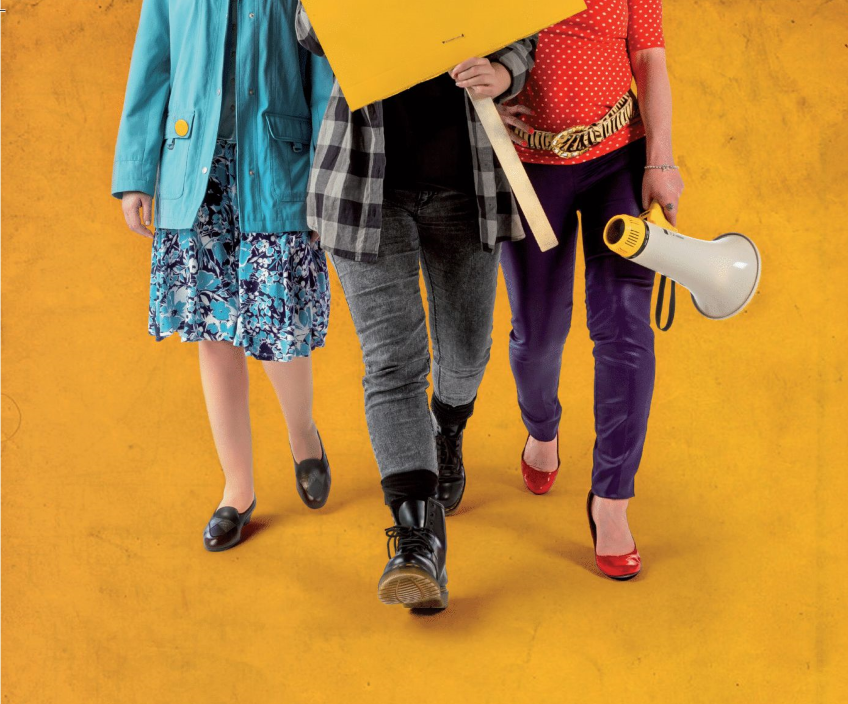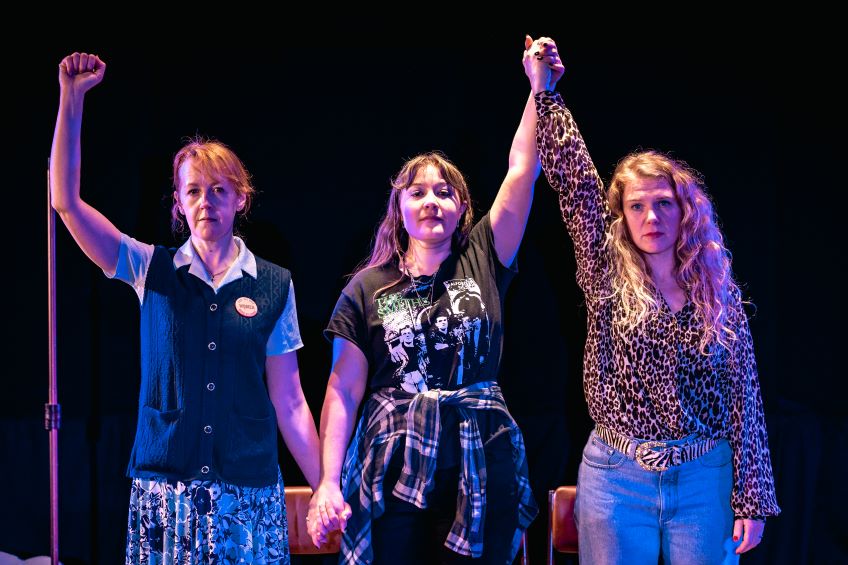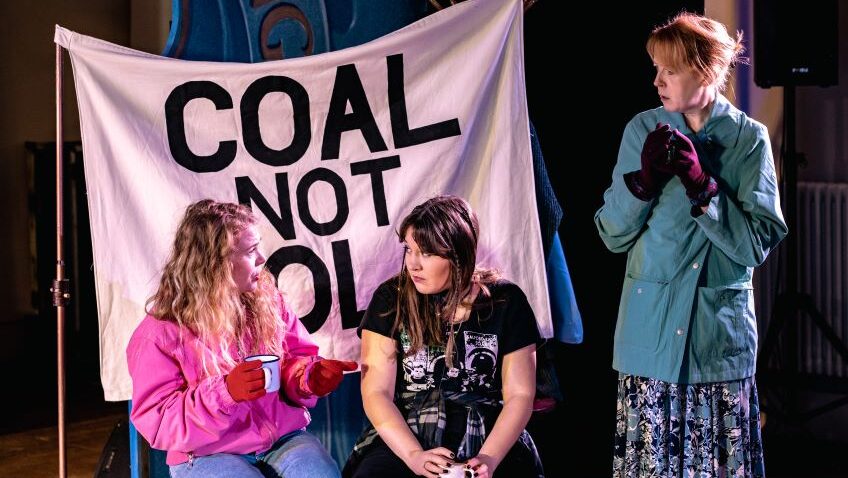Grim, brutal, poignant, moving, yet bursting with uplifting sparkle, laughter and hope, We’re Not Going Back is back – and with the same cast. It was ten years ago that Red Ladder Theatre Company first wowed audiences with this skilfully written musical drama, compellingly enacted and splendidly sung. With pith and humour it recreates a turbulent, pivotal slice of British life and history that unfolds in a pit village during the 1984-5 Miners’ Strike. With new tweaks to staging, direction and music the show continues to move and delight as it zips along via vivid anecdote, heaps of humour, brutal accounts and passionate, meaningful songs.
Writer, Boff Whalley, ex-Chumbawamba guitarist, sets just three characters onstage, three very different, often bickering sisters. The eldest, motherly Olive, church-going, staid and restrained at the outset, is played magnificently by Victoria Brazier, her brusque, dead-pan delivery of humour particularly engaging; Claire O’Connor portrays black-clad, Morrisey-mad Izzy as she turns eighteen, then nineteen, while Mary (Stacey Sampson) wants to go far in the world of acting – starting as Mary on roller-skates in Jesus Christ Superstarlight Express. But suddenly, in the fictional South Yorkshire pit village of Carston in 1984, their lives, relationships, motivations and aspirations turn from ordinary, bored-inary into extraordinary, and they change forever. And why? It’s because two of their partners are miners and the other a police cadet.

The miners’ strike was a grim, terrible time, filled with poverty, hardship, conflict and violence, devastating not just for swathes of men, but equally for families and communities as an entire way of life was ultimately eradicated forever. But the women didn’t just support the men: they came to embody absolutely the unflinching spirit, defiance and passion of the strike.
With the play’s focus on the women (based on real-life accounts), Eddie, Dean and Vinny don’t appear onstage, but they, and the changes in their lives, spring vividly to life in the short, snappy scenes, enacted by the women. Izzy’s ostracised Dean eventually has to reconsider his police career; Mary’s picket-resistant Vinny (with his gunky ganglion) has to make up his mind and Olive’s macho miner Eddie comes over all cordon bleu and chocolate fondue in the kitchen.
In spite of inspiring laughter throughout, there’s no stinting on graphic detail and serious tragedy. Olive’s passionate account of the bloody Battle of Orgreave and the song, This Is War are filled with heart-rending detail, while the media’s distortions of reality and the icy stance of Mrs M. Thatcher cut coldly through the air in posh-toned radio/TV news items, voiced by the cast.

Olive, Mary and Izzy find themselves thrust to the forefront as the strike progresses, fighting personal battles as well as wider ones. Prayerful, demure Olive grows witty, bold and defiant as chief agitator and leader for Women Against Pit Closures, “liberating” the church collection to the cause, tirelessly organising, motivating and inspiring everyone everywhere and railroading her reluctant sisters into key roles, which they eventually embrace wholeheartedly. Mary, forced into frenzies of fish-counter work, finds public speaking is actually just like talking – only loud (cue a catchy song) while Izzy gets busy, stealing herself even to desperately butcher a dead sheep in the living-room. Surprised at their hidden capabilities, the three gain confidence, determination, purpose, hope, courage and empowerment, and, once freed from their old roles, they realise that even when the men return to work, for them there’s no going back. The sisterly bonds are far stronger than before and by the time Izzy turns 19, it’s onwards and upwards for them all.
The set has been simplified this time, relying mainly on the repositioning and repurposing of props. This doesn’t, perhaps, embrace quite as fully as before the atmosphere of the era and one or two episodes lack former clarity, but the dynamism and momentum never flag as superbly brisk and skillful ensemble work interweaves humorous narrative and banter with music, all cushioning intense heartbreak, division and struggle with breezy charm and light-hearted optimism.
Interactions between the sisters are kept vibrant with spark and bounce and the voices of Brazier, Sampson and O’Connor blend deliciously in harmony. Beccy Owen, playing her arrangements on keyboard at the side of the stage, has some subtle interaction with the characters, too, and joins the vocals. Many songs, often folk/shanty style, earn well deserved applause of their own: the jaunty, blunt Stuck With Me, the poignant What Price Coal?, the forthright Everything’s Changed, the horrid and hilarious Washing the Miners’ Clothes – complete with washboard percussion, the devastating This Is War and the nostalgic Red City (Sheffield? Of course.)
In spite of all the deep-down tragedy, brutality and dire adversity, the women’s courage, hope and resilience shine through, and this top quality musical drama remains triumphantly uplifting and celebratory. Up with Red Ladder!
Eileen Caiger Gray




